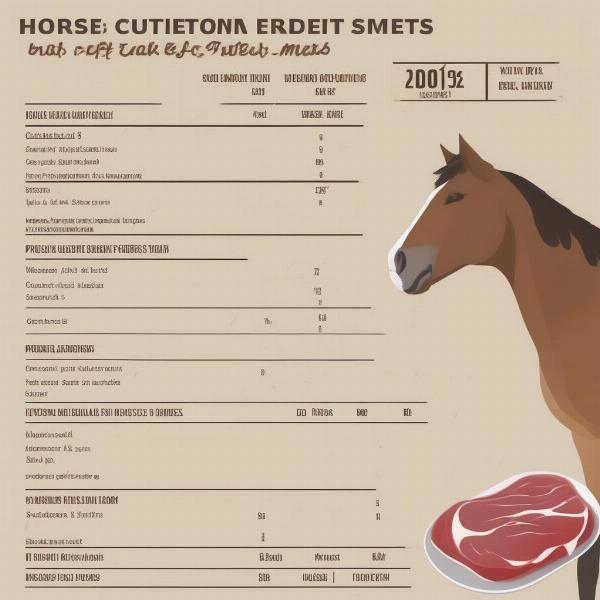Horse meat in dog food is a topic that often sparks debate and raises questions among pet owners. Is it safe? Is it nutritious? Why is it used in some dog foods and not others? This article will delve into the facts surrounding horse meat in dog food, exploring its nutritional value, potential benefits and drawbacks, and addressing common concerns. We’ll also discuss how to determine if horse meat is present in your dog’s food and provide insights to help you make informed decisions about your pet’s diet.
Horse meat has historically been used as a protein source in some dog foods, particularly in Europe. While less common in North America, it can still be found in certain brands. One of the key reasons for its inclusion is its high protein content and amino acid profile, which can be beneficial for muscle development and overall health in dogs. However, it’s essential to consider various factors before deciding whether dog food containing horse meat is the right choice for your furry companion.
Nutritional Value of Horse Meat for Dogs
Horse meat is a good source of protein and contains essential amino acids required for a dog’s growth and maintenance. It also provides vitamins and minerals like iron, zinc, and B vitamins. However, the nutritional composition can vary depending on the cut of meat and processing methods.
Is horse meat a complete protein source for dogs? Yes, it provides all the essential amino acids dogs need, similar to other meat sources like beef or chicken. However, a balanced diet requires more than just protein.
 Horse Meat Nutritional Chart
Horse Meat Nutritional Chart
Potential Benefits and Drawbacks of Horse Meat in Dog Food
One potential benefit of horse meat is its palatability. Many dogs find it tasty, which can be helpful for picky eaters or dogs with sensitive stomachs. Additionally, it can be a novel protein source, which might be suitable for dogs with allergies to more common proteins like chicken or beef.
However, some potential drawbacks need to be considered. Sourcing can be a concern, as regulations and quality control for horse meat can vary across different regions. Furthermore, some dogs might have an unknown allergy or intolerance to horse meat.
What are the signs of horse meat allergy in dogs? Symptoms can be similar to other food allergies and include itching, skin rashes, digestive upset, and ear infections.
Identifying Horse Meat in Dog Food
Regulations require manufacturers to list all ingredients on the pet food label. Look for “horse meat” or “horse meat meal” listed as an ingredient. If it’s not clearly stated, contact the manufacturer directly for clarification.
How can I be sure the horse meat is sourced ethically? Choose reputable brands that are transparent about their sourcing practices and adhere to strict quality control standards. Look for certifications or labels that indicate ethical sourcing.
Choosing the Right Dog Food with or without Horse Meat
Selecting the right dog food involves considering various factors, including your dog’s age, breed, activity level, and any health conditions. If you’re considering a dog food containing horse meat, consult with your veterinarian, especially if your dog has known allergies or sensitivities.
What are some alternatives to horse meat in dog food? Other novel protein sources include venison, kangaroo, and insect-based proteins. Traditional options like chicken, beef, lamb, and fish are also available.
Conclusion
Horse meat can be a viable protein source in dog food, offering nutritional benefits and palatability. However, sourcing and potential allergies are important considerations. By carefully reading labels, consulting with your veterinarian, and choosing reputable brands, you can make informed decisions about incorporating horse meat into your dog’s diet.
FAQ
- Is horse meat safe for dogs to eat? Yes, horse meat is generally safe for dogs to eat if it is sourced responsibly and prepared appropriately.
- Is horse meat more nutritious than other meats? Horse meat offers a good source of protein and essential nutrients, but its nutritional value is comparable to other meats like beef or chicken.
- How can I tell if my dog is allergic to horse meat? Look for symptoms like itching, skin rashes, digestive upset, and ear infections. Consult with your veterinarian for diagnosis and treatment.
- Why is horse meat less common in dog food in some countries? Cultural factors and variations in regulations and sourcing practices contribute to the differing prevalence of horse meat in dog food across regions.
- Are there any ethical concerns surrounding the use of horse meat in dog food? Ethical sourcing and humane treatment of horses are crucial considerations when choosing dog food containing horse meat.
- What should I do if I suspect my dog has a horse meat allergy? Discontinue feeding the suspected food and consult with your veterinarian immediately.
- Are there any specific dog breeds that benefit more from horse meat? There are no specific breeds that inherently benefit more from horse meat. Individual needs vary based on factors like age, activity level, and overall health.
ILM Dog is your trusted resource for comprehensive dog care information and expert advice. We cover various topics, from breed selection and health care to training, nutrition, and product recommendations. For personalized guidance on selecting the best diet for your furry friend, including advice on novel protein sources like horse meat, contact our team of experts at [email protected] or call us at +44 20-3965-8624. ILM Dog is dedicated to helping you provide the best possible care for your canine companion.